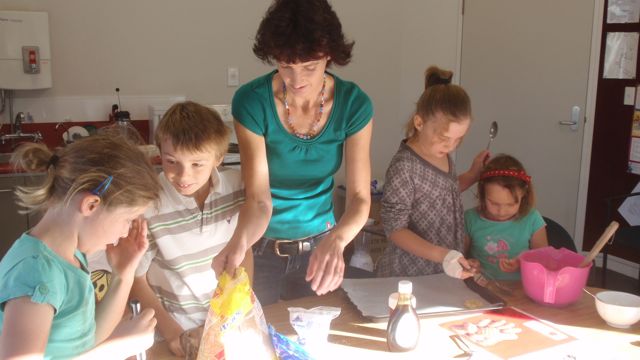During the holidays I attended the Cutting Edge Conference in Porirua. As well as presenting I was able to attend a couple of workshops. One that intrigued me was about Discovery Time, run by Brenda Martin and Gay Hay co-authors of the book, Discovery Time- Developing Key Competencies through activity based, child-directed learning.
I gave it a go for the first time on Friday and it was a great success so I thought it worth sharing. Here are my notes…
Discovery Time is a 90 minute, action, activity based programme reminiscent of Developmental in the old days. The teacher is engaged with the learning as well. Parents have to be reminded of need to ask questions and not to solve problems. It is well planned with structured, activity based activities- it can bring the week’s programme together.

Activities could be constructing, painting, drawing, weaving flax, parent passion, outside activities, skipping, sanding, sandstone carving, dressing up, making movies, carpentry, Lego robotics kit, shadow puppets, OHP stories, cooking, skipping, new food tasting, spending more time working on something that hasn’t been finished, Journal craft activities, clay, water play, trains, darts, juggling, musical instruments, clothing design, marble tracks. There are heaps more ideas in the book.
It is student centred learning based on play, creativity, activity and centred around the child. The teacher or parent doesn’t try to solve the problems for the child but leads the child to solve problems and challenges for themselves. The teacher lets go a little and hands the control more to the children.
The structure of the lesson-
- Introduction- key competencies eg managing self- managing our gear- we discuss first what it would look like if we were managing ourselves well ( Y-chart).
- Activity time- doing the activities from a menu of choices- children select what they would like to do- if there is an over-subscription the opportunity to do an activity will come up again another time.
- Share what you’ve done, buddy-up, photos, share- before we pack up.
- Reflection- after we’ve packed up. Thinking about what we’ve learnt. I would use Wallwisher to record our thoughts if I had more laptops to record with.
- List of ideas from kids on what they would like to be doing next week. And also list of who has missed out that would like to have another go next week.
The Discovery Time book has a CD of ideas and resources to use to supplement the programme. Here is my planning sheet for the session minus the individual targeting section.
Our first session went really well on Friday with children totally ‘in the zone’ for the whole hour and a half. I liked particularly that I wasn’t ‘teaching’ the whole time and had the opportunity to sit next to the children as they worked rather than directing them to complete tasks. Children appreciated the opportunity to delve more deeply into an activity for an extended length of time. Next time I would add some more artistic, creative activities to our list of choices.
I liked the Discovery Time concept as we talk about creativity, child-centred learning, key competencies and life long learning it ticks all the criteria of what learning is.
As we finished Friday after a Discovery Time, a workshop with the St Johns First Aid instructor, Jump Jam and ANZAC assembly one cherub, about to go home for the day said, “It’s been just like a birthday party today!” A good way to finish the week.
